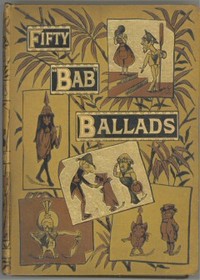Ballad: Sir Macklin
bySir Macklin appears early in the narrative, a figure robed in authority and armed with unshakable moral principles. A priest by vocation and a crusader by temperament, he sees himself as the final defense against the creeping tide of Sabbath disregard. His gaze is firmly fixed on three carefree young men—Tom, Bob, and Billy—whose weekend jaunts through the city’s green spaces strike him as emblematic of all that is wrong with modern society. Their laughter rings through Kensington, their conversations drift lazily across Hyde Park, and their stylish boots find their rhythm along the lanes of St. James’s. To Sir Macklin, this isn’t youthful leisure—it’s a willful slide into moral ruin.
Compelled to act, he crafts a plan not of punishment but of persuasion. He approaches the trio not with fire and brimstone, but with reason and rhetoric. His strategy, however, is exhaustive. With the precision of a lawyer and the patience of a lecturer, he builds a case against Sunday walks. First, he recounts the sacred nature of the Sabbath, drawing from scripture, church history, and a smattering of moral philosophy. Then he identifies the specific dangers each park holds—temptations too subtle for the untrained eye but devastating in consequence, or so he insists.
What makes Sir Macklin such a memorable character is not just his conviction, but the sheer volume and velocity of his reasoning. He argues with the fervor of a man possessed by logic. Every objection the young men raise is met with a counterpoint, sometimes two, each supported by an elaborate web of hypothetical scenarios and cautionary tales. A walk in Kensington Gardens, he warns, could begin with a nod to a stranger and end in total spiritual decay. He draws diagrams in the dust with his walking stick, mapping out how sin evolves from step to step, from casual conversation to outright perdition.
Tom, Bob, and Billy, unprepared for this deluge of discourse, find themselves overwhelmed. At first, they exchange glances, stifling chuckles. But Sir Macklin does not flinch. He continues undeterred, reciting lines he’s clearly practiced, possibly in front of a mirror, late into the night. At one point, he references ancient Greece, linking the decline of Athenian morality to too many open-air discussions on sunny afternoons. No connection is too far-fetched for Sir Macklin if it helps support his thesis: leisure on the Sabbath is a gateway to doom.
As his sermon stretches into its third hour, a shift occurs—not in belief, but in posture. The boys, once lounging casually, now sit upright, eyes wide and hands occasionally raised—not in praise, but in protest or perhaps confusion. It becomes clear that Sir Macklin’s campaign has not sparked guilt, but exhaustion. Still, the priest remains convinced that his words are sowing seeds of reform. He imagines them avoiding parks forevermore, trembling at the thought of an idle Sunday stroll.
What the ballad ultimately reveals is not a transformation of hearts but an ironic portrayal of overzealousness. Sir Macklin’s tireless efforts are comic in their excess. The boys may never skip the park again—but only because they fear encountering him, not because they were persuaded by his logic. This is where the humor lands: the disconnect between a speaker’s intent and his actual effect. Rather than becoming converts, the boys become escapees—dodging lectures more than they dodge sin.
From a modern perspective, Sir Macklin’s character serves as a cautionary example of how moral arguments, even well-intended ones, lose power when drenched in dogma. The story doesn’t dismiss moral values but questions the methods by which they are communicated. An audience, particularly one already leaning toward skepticism, rarely responds well to a sermon that feels more like a siege. Humorously, Sir Macklin becomes a caricature of moral rigidity—a man who forgets to listen in his quest to be heard.
Yet, for all its satire, the ballad also highlights something more nuanced. Sir Macklin is not evil or even disingenuous. His concern is real, his passion sincere. In his own way, he’s trying to save lives—or souls, at least. What fails is not his heart, but his delivery. Without room for joy, nuance, or dialogue, even the purest intentions can become unbearable burdens. Sir Macklin’s downfall is not his message, but his method. And that, perhaps, is the most enduring lesson of all.

